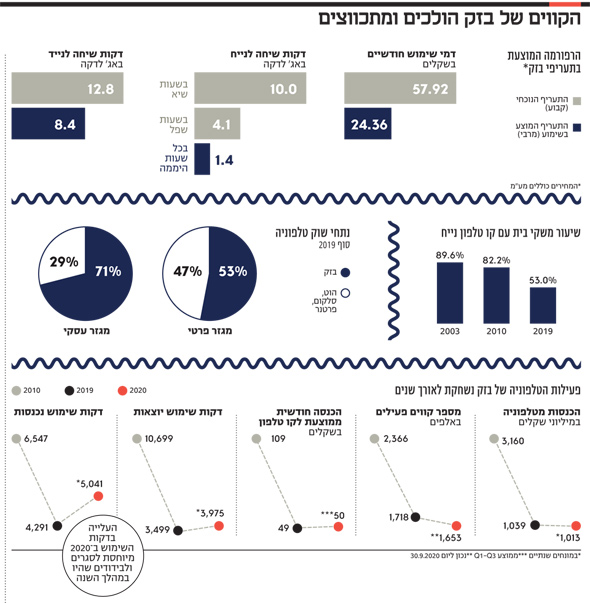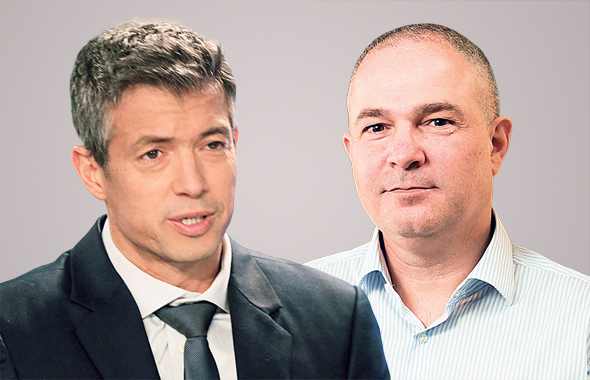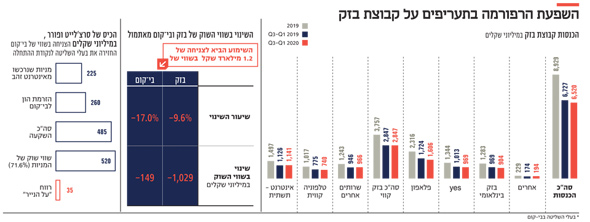
Just before he leaves his office, Communications Minister Yoaz Handel issued a dramatic hearing for Bezeq yesterday, in which its telephony service tariffs will be significantly reduced.
Read more in Calcalist:
Bezeq’s telephony tariffs are set by the Ministry of Communications and the last update was made in 2003. After 17 years, the ministry recalled that Bezeq had excess profitability from this sector, which it itself had created and refrained from addressing this issue over the years. When Handel took office, he demanded that the treatment process be accelerated, and about a month ago he was presented with the final economic opinion, written by Prof. Reuven Gronau and Dr. Ofer Raz-Dror, the ministry’s deputy director of economics.
The monthly usage fee for a telephone line is currently at a fixed rate of NIS 57.92 including VAT. The opinion offers a maximum rate of NIS 24.36. A maximum rate of 1.4 cents 24 hours a day. The rate for a minute of calls to mobile networks is currently 12.8 cents. It is proposed to set a maximum rate of 8.4 cents. In addition, additional discounts were calculated for landline phone users.
According to the Ministry of Communications, the move will reduce the monthly payment of telephone subscribers by about 40%, from an average of NIS 60-50 per month to an average of NIS 40-30 per month. This reduction for the consumer has significant implications for Bezeq, its shareholders, and its controlling shareholders.

Flocking from the old dial to the touch screen
The Bezeq Group’s revenues from the telephony sector amount to about NIS 1 billion a year. This amount constitutes about a quarter of Bezeq’s revenues from the fixed line segment, and about 11% of Bezeq Group’s total revenues, which also include the activities of its subsidiaries, Pelephone, Yes and Bezeq International.
 Right: Bezeq CEO Dudu Mizrahi and outgoing communications minister Yoaz Handel. Alongside the sticks, Bezeq also has carrots Photos: Yachz, Yariv Katz
Right: Bezeq CEO Dudu Mizrahi and outgoing communications minister Yoaz Handel. Alongside the sticks, Bezeq also has carrots Photos: Yachz, Yariv Katz
A comparison between the former finance minister, Moshe Kahlon, who led the reform in the cellular market, and Handel, who published the hearing in favor of reducing tariffs for Bezeq’s landline home phone service, is very different. Kahlon’s reform bit the cash cow of all communications companies while cellular company profits were at their peak. In contrast, Handel is threatening Bezeq’s telephony operations while it has been declining for years. Kahlon hit the hit, Handel hit the hit.
In the last decade, there has been a significant trend of erosion in Bezeq’s telephony operations. A period in which the number of active lines fell by 30% from 2.37 million lines to 1.65 million lines as of today, and throughout which the average monthly income per telephone line fell from NIS 109 to NIS 50. The public is pointing fingers at the dial to the touch screen and this is reflected in a 68% drop in Bezeq’s revenues from the telephony sector over a period of 10 years.

This is even before we talked about the hearing that is expected to reduce the expenses of Bezeq’s fixed telephony consumers by NIS 331 million (about NIS 390 million including VAT). Income of NIS 331 million is more than a slight blow to Bezeq’s wing, and this fact was reflected in the reaction of investors on the stock exchange yesterday. If Bezeq does not succeed in eliminating the evil in the hearing, it will mean that its annual net profit will shrink by 25%.
Bezeq shares ended the trading day with a 9.6% drop, mimicking NIS 1.03 billion from the company’s market value. The share of Beecom, which controls Bezeq, which owns 26.7% of its shares, dipped 17% and lost NIS 149 million.
Chance of a price reduction for competitors as well
The move by the Ministry of Communications actually expresses failure rather than success. What was supposed to lower Bezeq’s excess profitability and prevent the current hearing is the opening of the company’s telephony sector as part of the wholesale market reform. As part of the same reform, which was similarly announced by then-Communications Minister Gilad Ardan on the eve of his departure from the firm, Bezeq’s competitors rent the infrastructure from it for a fee. But while the wholesale internet market is booming, the wholesale telephony market has not yet started operating five years after the reform began.
Over the years, Bezeq has refrained from allowing its competitors to lease its telephony infrastructure, which has prevented competition in the field and left the profits in the hands of themonopoly. Today she claims that the issue has been resolved, but the competitors are simply not interested in the service. This issue also stands as part of the accusations in the 4000 case, in which former director general of the firm Shlomo Pilber tried to promote an alternative to the wholesale market, one that would benefit Bezeq.
Meanwhile, the Tel Aviv District Court is facing a ruling in an administrative petition filed by Bezeq against the Ministry of Communications’ decision to impose on the company Financial sanction Of NIS 11 million, for not implementing the wholesale market reform in the telephony market. Today, the alternative offered to Bezeq is a telephone infrastructure based on HOT, Cellcom or Partner’s Internet infrastructure, which is considered the least stable. The change in the situation in which Bezeq’s prices will be reduced is not expected to significantly harm competitors, since most of their customers purchase the telephony service mainly as part of triple packages, in which the service is priced low in relation to the total price. Bezeq, on the other hand, does not have a permit to sell Triple. It is likely that the change will actually lead to lower prices for competitors as well.
The said hearing relates only to the private market, in which Bezeq has about 53% market share. The ministry explains that in the business market, in which Bezeq has about 71% market share, competitors offer technology-based alternatives different from the private market, which is comparable to Bezeq’s, and therefore competition in it is equivalent and there is no need to intervene. The Ministry of Communications was debating whether to publish the hearing, in light of the fear that Bezeq would “take revenge” on the ministry, and sabotage its fiber-optic project, which the ministry has been hoping for years to start.
Bezeq is required to present to the ministry the areas in which it would like to deploy fiber, and the ministry hopes that it will choose as large a scope as possible. During the Economic Committee’s discussions this week ahead of approving the outline for a second and third reading, Bezeq claimed that it would not be able to present the data to the ministry before mid-2021. In light of the fragile political situation, the ministry decided not to wait and publish the telephony hearing this week. In light of Handel’s dismissals that take effect this evening, the minister demanded that the hearing be published without further delay, even though the ministry was still working on final wordings.
“Extreme Hearing and Bolshevik Regulation”
Bezeq received the hearing with complete surprise and according to their response, it seems that the ministry’s concerns regarding the impact on the fiber project were not far-reaching. “It is sad to see that on the eve of the launch of Bezeq’s fiber optic network, the largest and most ambitious communications project ever undertaken in the communications market in Israel at a cost of billions of shekels, the Ministry of Communications publishes an extreme and disproportionate hearing. “We are in charge of retail telephony services in the 21st century. We are sorry that precisely these services provided to every citizen and in every settlement in Israel, become a tool in an unnecessary political game, using Bolshevik regulation that we thought had already passed from the world.”
Bezeq also stated last night in a report to the stock exchange that “a material adverse effect on the company’s financial results is expected.” Bezeq intends to oppose the hearing and is even considering submitting it to the High Court.
Tomer Raved, CEO of Bi-Com, also commented on the announcement of the hearing and said that “the announcement could directly harm the ability of telecom companies to invest in infrastructure in Israel and will deter foreign investors from operating in Israel.”
The changes being considered require amendments to regulations and therefore all that is required after the hearing is a determined decision of the next minister to enter the ministry. However, it is also required for the approval of the Minister of Finance and as the precarious political situation continues, it is likely that the handshakes will delay the change.
Since Handel took office in May, he has led to a number of decisions that actually benefit Bezeq, and their results could subsidize the expected harm from the current hearing. The most significant benefit is the promotion of the fiber-optic layout, which removes from Bezeq the nationwide deployment obligation. In addition, Bezeq was approved to launch a speed of 200 MB, compared to the 100 MB it currently provides. Another reform that benefits Bezeq is the elimination of the split between infrastructure and the supplier, so that the company can sell a full Internet service, regardless of the small providers. Even before that, Handel authorized Bezeq to market a package of power infrastructure in one invoice and without a time limit. Both moves are expected to strengthen the company’s power.